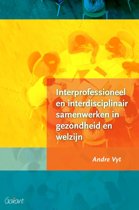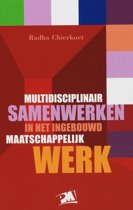
Casemanagement is een methodiek voor integrale en interdisciplinaire hulpverlening, die de samenwerking tussen vertegenwoordigers van verschillende beroepsgroepen centraal stelt. Dit sluit naadloos aan op de ontwikkelingen in het beroep van sociaal werker, die samenwerkt met andere disciplines in bijvoorbeeld sociale wijkteams.

Dit boek behandelt de verschillende aspecten die belangrijk zijn bij het samenwerken over beroepsgrenzen heen, waarbij de deskundigheden van verschillende gezondheidswerkers gecombineerd worden voor een betere gezondheidszorg.

Het maatschappelijk werk wordt dikwijls in een omgeving verricht waarin andere disciplines dominant zijn. Het maatschappelijk werk in de gezondheidzorg, in scholen of in bedrijven zijn daarvan bekende voorbeelden. Dit boekje beschrijft de gevolgen daarvan voor de maatschappelijk werker en geeft onder meer tien methodische stappen om hiermee om te gaan.
Analysing Design Thinking: Studies of Cross-Cultural Co-Creation brings together 28 contributions from internationally-leading academics with a shared interest in design thinking who take a close look at professional designers working on a project that not only involves soft deliverables, but where a central role is played by co-creation across multiple, culturally diverse stakeholders.
Hero, L-M., & Lindfors, E. (2019). Students’learning experience in a multidisciplinary innovation project. Education + Training, 61(4), 500-522. https://doi.org/10.1108/ET-06-2018-0138
Collaboration between universities and industry is increasingly perceived as a vehicle to enhance innovation. Educational institutions are encouraged to build partnerships and multidisciplinary projects based around real-world open problems. Projects need to benefit student learning, not only the organisations looking for innovations. The context of this study is a multidisciplinary innovation project, as experienced by the students of an University of Applied Sciences in Finland. The purpose of this paper is to unfold students’ conceptions of the learning experience, to help teachers and curriculum designers to organise optimal conditions and processes, and support competence development. The research question was: How do students in higher professional education experience their learning in a multidisciplinary innovation project?